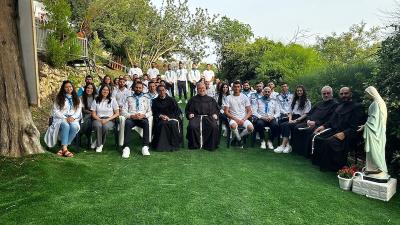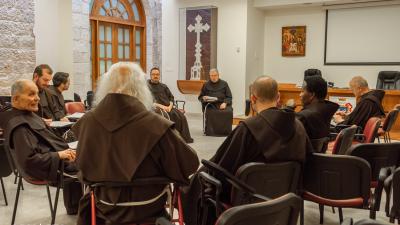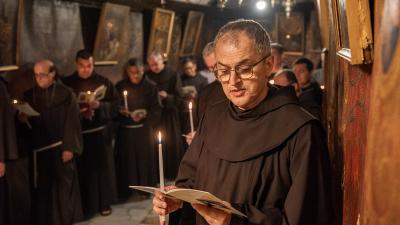
On October 6, the community of the Friars Minor of the Custody of the Holy Land met at the Church in St. Savior’s Monastery in Jerusalem in order to welcome and bless the solemn profession of two minor friars: Br. Marco Carrara and Br. Marlon Trinidad Méndez Pavón.
Br. Marlon, 38, comes from Nicaragua, and he is preparing to go to the Monasteryin Mount Nebo in Jordan for a year of intensive Arabic language studies, while Br. Marco, 34, comes from Italy and is currently on his second year of Psychology at the Hebrew University of Jerusalem.
In the celebration presided over by the Custos of the Holy Land, Fr. Francesco Patton, he reminded the friars of three points not to forget: “It is God who has chosen you,” he said.“It is the wisdom of the cross that guides you; brotherly love is your life standard.” In his homily, the Father Custos described the sense of obedience within the Church and within the fraternity, reminding the professed brothers to be simple instruments, capable of letting themselves be conquered by God. He reminded them that they are called to live without anything of their own because the Kingdom of God belongs tothe smallest and most beloved of that Love in which the vow of chastity finds its foundation “that must lead us not to love less, but to love more, to the point of giving of ourselves to every man, every woman, every creature.” The Father Custos highlighted the fact that Br. Marco and Br. Marlon are great gifts for their fraternity, inviting them not to be discouraged because they are God’s gifts to the fraternity so that they can again learn, every day, what it means to become brothers in the Lord.
The brothers then read their solemn professions, written in their own words, each in his own native language. The Custos blessed them with his hands and welcomed them to the fraternity with a hug.
So as to get to know them better a few days before their Solemn Profession, Br. Marlon and Br. Marco told us their stories by answering some questions.
Why Franciscan? How did you discover your vocation?
Marlon: I had never thought about the possibility of becoming a Franciscan friar. The thing I was attracted to was the monastic life: the idea of leaving the world and devoting my entire life to God. But, after completing my degree in Spanish, I started working in an Augustinian school, connected to the Franciscans, with whom they shared different activities. I got to know the friars that way. They suggested that I read passages from the life of St. Francis and so I began to learn more about this life.
Marco: I was a carpenter; I had a lot of friends and I really liked my life. Out of personal interest, I started to delve into Religious Studies, exclusively for my own personal culture, but along that journey something inside of me changed. After my studies, I became a religion teacher but I would never have thought of a religious vocation.
Then I started researching and initially I did vocational courses with diocesan priests, but I did not feel particularly attracted by that lifestyle. One day by “chance,”I happened upon the Monastery of Montefalco with a friend and there I discovered that this was the Postulancy house of the Custody but I had never heard of it. In that place and with the Franciscans I discovered the community and the international life of the friars of the Custody, a “community life in prayer”: this is what struck me the most and that I did not know before. Everything else surely came later and I also attended Montefalco. I also gained knowledge of St. Francis, of the Holy Land and of course of the Custody.
Thinking back to your vocation, what are the most important aspects of your story?
Marlon: I immediately think of two things, two deaths. The first was the death of a friend who saved me from dying in a river; he was really well liked in my city and beyond: he attended a parish youth group. I participated for the first time in it because they held an event in his memory and I liked what I saw. Little by little, while I was making friends with the other guys who often asked me for me for advice, I asked myself: why not become a religious? The second death binds me to the Holy Land: when I was already a friar in Central America, and they killed the Commissioner of the Custody in Nicaragua because they wanted to steal from him. Fr. Bruno Varriano, at the time vocations director of the Custody, came to his funeral and told me about the possibility of going to the Holy Land with some scholarships and so I came here.
Marco: For me, the basic element is the experience of feeling loved, of remembering God’s mercy. When I am in a crisis, I find the elements and the episodes that remind me about this and that reassure me, and my vocation is renewed and reconfirmed. There are many elements and episodes, but for me they are accessory: coming back, feeling loved, for me this is fundamental. Beyond this first element, which is important for my life, is meeting with people whoever they might be. Religious life offers a chance to get closer to people’s lives in a new way, which I am discovering this and I also enjoy it. It offers the possibility of a deep, enriching type ofsharing. I think that as a religious it is easier to put the person who happens to be in front of you in the center, and to be present for him or her at that moment. When it comes to sharing with others, I think this is the important thing: for the other personto know that the religious in front of him or her is listening and is completely present.
What kinds of struggles did you encounter when you arrived in the Holy Land?
Marlon: I was used to youth ministry with the farmers. I was always busy with teaching, catechism and other activities. When I came here to the Holy Land I did not know Italian, and it was the first time I had traveled so far from Central America. Initially, I went completely into a crisis because everything was different: from the language, to the food, to the culture. At that time, Fr. Dobromir, the Vicar of the Custody, helped me a lot. He told me: “You must make a decision and realize that God has made a plan for humanity here in this land, in this same land that you came to protect. Do you want to stay here, where Christ was born, to witness to the pilgrims and locals, in the name of the Church?” After deciding to stay, I opened my eyes to many things. First of all the fact that the Custody does a lot more pastoral ministry than I thought: with the local youth, the elderly and all of the people we help.
Marco: I miss the rocky peaks that I was used to: the Italian Alps. I have not encountered too many hardships, but certainly many challenges. These challenges ultimately have helped me: languages, different Christian traditions, new foods. For me this is what gives “salt” to life.
What did you discover in religious life?
Marlon: I feel like I have found what I was missing. I feel like I have filled the void I was carrying inside. I always felt a void but here in the Holy Land I realized that this was what I was looking for: fraternity, understanding, a new point of view to live life. I wanted something for which to feel really full, to be fully myself. If I had to do it over, I would certainly choose the same life.
Marco: For me it is above all a form of personal growth. Here I feel like I have been molded by God with a hammer and chisel: before beginning community life, I was much more closed-off and intolerant. Now I am aware of a change in my mindset and character and, although I think there is still much work to do, this life is good for my growth as a man.
Giovanni Malaspina




